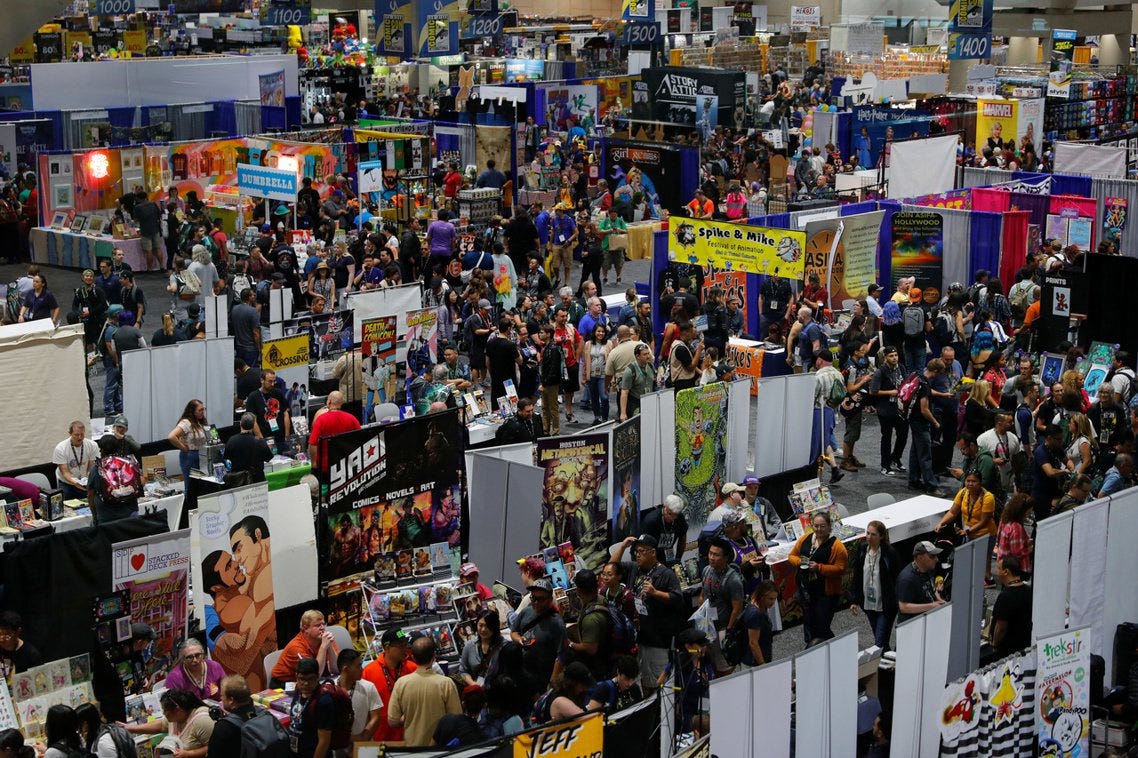Even this year, the San Diego Comic-Con devoted time to discussing recent developments and future trends in the manga publishing industry.
Manga sales continued to be strong for the third highest year on record (and trending higher than 2020). While the future of manga appears bright from the licensing perspective, ongoing uncertainty about the economy and lingering concerns about the availability of resources weighed heavily on publishers’ minds at the Manga Industry Publishing Roundtable.
Deb Aoki (Mangasplaining) moderated a panel of experts that included Kevin Hamric (vice-president, marketing and sales, Viz Media), Jamie Kim (business development lead, Manta), Ben Applegate (director, publisher services, Penguin Random House), Bobbi Chase (executive editor, WEBTOON Unscrolled), Leyla Aker (director, publisher services, Square Enix Manga), Michael Gombos (senior director, international publishing and licensing, Dark Horse Comics) and Ed Chavez (publisher, Denpa Books).
Here is a rundown on the topics the panel covered, from new licenses debuting in 2024 to the state of manga publishing, lessons learned over the past year and predictions for the next five years.
What is fueling manga growth?
Kevin: Manga sales are trending higher than in 2020. If sales continue for 2023, this will be the third largest year on record.
Leyla: Manga sales in North America are cyclic. Cable initially fueled manga growth in 2007, but streaming has propelled its growth in recent years. “Instead of having everything driven by cable anime cartoon networks, it’s being driven largely by streamers. People not only can watch anime on Netflix. They can watch it on Hulu. They can watch it on Disney+. You can watch it on any number of smaller lateral channels.”
Michael: Competition, with publishers competing for the same licenses and readership.
Bobbi: An expansion of titles, specifically for romance. For WEBTOON Unscrolled, this means expanding from 15 YA titles in 2023 to 24 titles annually moving forward.
Ben: “What’s interesting to me is that it feels more diverse now than it did in the 2000s… I don’t hear people as much arguing about what manga is or isn’t. It just doesn’t seem like this generation of readers cares that much about manga produced in Japan for a Japanese audience. Now there’s a bunch of Japanese authors making comics specifically for French audiences.”
What keeps you up at night?
Kevin: The economy is the big unknown. He anticipates that 2023 will finish flat, but new content from Japan, Korea and China may still be up.
Ben: Expanding costs not just for resources, but the war in Ukraine has disrupted the supply chain. Overseas shipping logistics are also a headache.
Michael: While people are still hungry for manga, higher price points might be a worry.
What are the bright spots or lessons learned?
Leyla: While anime remains a big driver behind manga, print titles have taken on a resurgence. “One of the things that personally I’m very interested to see is, are we going to start seeing that proportions shift? This also ties back to Michael’s point about deluxe editions… for whatever reasons our readers here want print. They want beautiful physical objects. They want things they can collect.”
What do you predict for the manga landscape for the next five years?
Jamie: Content publishing continues to expand. Webcomics still has room to grow.
Kevin: Pop culture still has growth opportunities and will be content-driven.
Ben: More content by Japanese creators for global audiences.
Ed: Consolidation and the cyclical movement of pop culture, competition with other publishers for titles. “Hopefully the economy doesn’t sour or if it does, that’s where things get really dicey.”
Michael: Aim for things you want to do so as not to lay people off or cut titles or series from shelves.
Economics may have driven the bulk of the discussions in the manga industry publishing roundtable, but the volume of global content and reader demand for new content provided some relief from these concerns. Still, some attendees expressed alarm at the inflationary costs of readership and wanted reassurances for maintaining current pricing. But alas, economics continues to be the elephant in the room.
Source: comicsbeat.com



